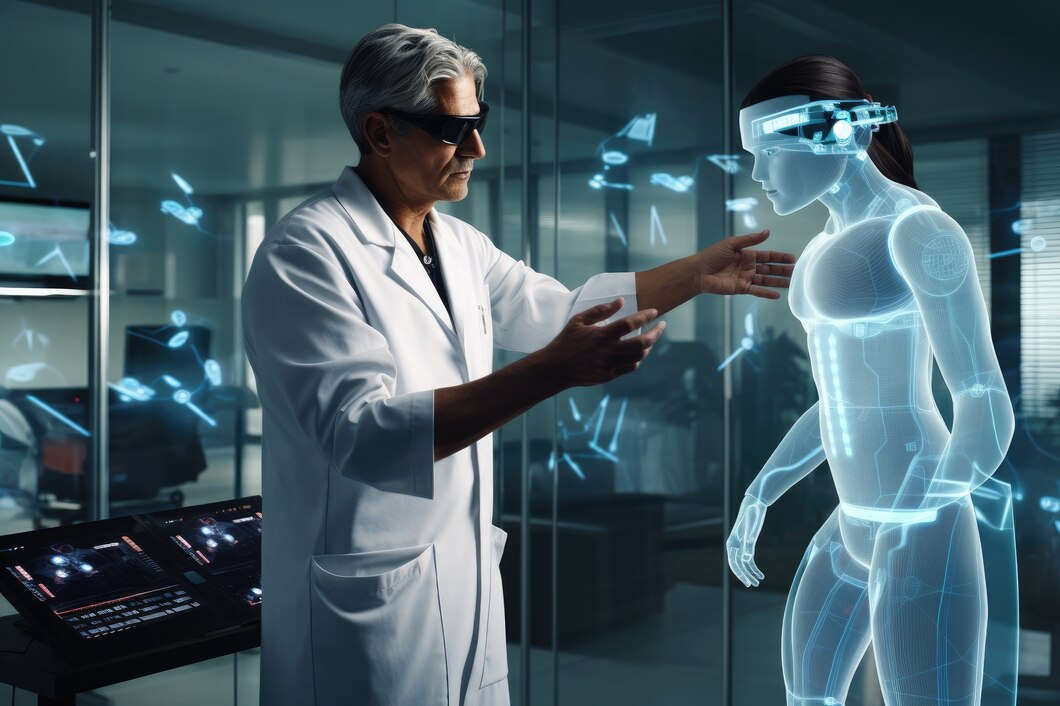
Machine Learning in Healthcare: Unlocking the Potential for Better Patient Care
Machine learning transforms healthcare by assisting medical professionals in patient care and clinical data management. As a branch of artificial intelligence, it enables computers to replicate human learning and decision-making processes.
In healthcare, machine learning collects and manages patient data, analyzes trends, suggests treatments, and more. Healthcare providers increasingly recognize its potential to improve decision-making and minimize risk, which has led to exciting career opportunities.
While “artificial intelligence” and “machine learning” may sound complex, many principles are grounded in basic mathematics and programming. Understanding the fundamentals of machine learning in healthcare can open the door to tackling more advanced challenges and driving innovation in healthcare careers.
How Machine Learning is Revolutionizing the Healthcare Industry
Machine learning is revolutionizing healthcare by offering more efficient and accurate ways to analyze and interpret complex medical data than traditional methods. The innovation is unlocking numerous opportunities to enhance patient care. Here are several key ways machine learning is driving change in the healthcare industry:
4 Key How Machine Learning Revolutionizing the Healthcare Industry
- Early Disease Detection and Diagnosis: Machine learning algorithms can identify patterns in large datasets, improving early disease detection. By analyzing medical records, genetics, and imaging, these algorithms can spot warning signs often missed by human physicians, leading to timely interventions and better patient outcomes.
- Personalized Treatment Plans: Machine learning evaluates patient characteristics and treatment history to create customized treatment plans. It considers genetic factors, lifestyle, and medical history to optimize each individual’s recovery chances.
- Predictive Analytics and Proactive Intervention: Machine learning models predict disease progression by analyzing historical data, identifying high-risk individuals, and providing insights for proactive interventions. This approach helps prevent complications, especially in chronic conditions like diabetes and hypertension.
- Streamlining Administrative Tasks: Machine learning also reduces the administrative burden in healthcare. Automating tasks like appointment scheduling, health record management, and billing allows healthcare providers to focus more on patient care than administrative duties.
Benefits of Applying Machine Learning to Patient Care
Machine learning offers significant benefits to patient care while presenting challenges that must be addressed. Here’s an overview of how it enhances healthcare:
- Enhanced Accuracy and Efficiency: Machine learning algorithms can quickly process large medical data, improving diagnostic accuracy and treatment outcomes. By analyzing patient information, medical images, and genetic data, these algorithms can identify patterns and make precise predictions that traditional methods may miss.
- Personalized Treatment and Precision Medicine: Machine learning enables the development of personalized treatment plans tailored to individual patients. By considering factors like genetics, medical history, and lifestyle, it provides customized recommendations for treatment, medication, and lifestyle adjustments, improving outcomes and reducing adverse reactions.
- Real-time Monitoring and Early Warning Systems: Machine learning can monitor patient data in real-time, detecting anomalies or changes in a patient’s condition. This enables timely interventions and helps prevent complications, particularly for patients with chronic conditions, by reducing the likelihood of emergencies.
- Data-Driven Insights and Decision Support: By analyzing large datasets, machine learning offers valuable insights that help healthcare providers make better decisions. These insights can guide diagnosis, treatment plans, and medication choices, improving accuracy and patient outcomes.
Challenges of Applying Machine Learning to Patient Care
While machine learning offers significant potential, it also presents challenges that must be addressed. Here are some key obstacles:
- Data Quality and Integration: Machine learning relies on accurate, well-integrated data. However, healthcare data is often fragmented, inconsistent, and incomplete. Ensuring data quality and effectively combining disparate sources remains a major challenge in deploying machine learning solutions in healthcare.
- Privacy and Security Concerns: Healthcare data is highly sensitive and subject to strict privacy laws. Implementing strong security measures and adhering to regulations to protect patient information when using machine learning algorithms is crucial.
- Interpretability and Transparency: Many machine learning models operate as “black boxes,” making it difficult to understand their decision-making process. To ensure trust and accountability in healthcare, there is a growing need for models that clearly explain their decisions.
- Ethical Considerations and Bias: Machine learning models trained on historical data may reflect biases or inequalities, which could perpetuate healthcare disparities. Ethical practices like fairness, accountability, and transparency must be prioritized to prevent biased outcomes.
Understanding Medical Diagnosis with Machine Learning
Accurate and timely diagnosis is vital. Machine learning is a valuable tool in enhancing diagnostic processes by analyzing medical data and detecting patterns that human physicians may overlook. Here’s how machine learning in healthcare contributes to AI for medical diagnostics and healthcare improvement:
- Leveraging Big Data for Diagnosis: Machine learning can process vast amounts of data, including patient records, medical images, and genetic information, to uncover subtle patterns that human observers may miss. It enhances diagnostic accuracy and provides valuable insights.
- Image Recognition and Medical Imaging: Machine learning, particularly convolutional neural networks (CNNs), excels in analyzing medical images, identifying abnormalities, and assisting radiologists in detecting conditions such as tumors and fractures with high precision, reducing errors and speeding up diagnoses.
- Clinical Decision Support Systems: Integrated into clinical decision support systems (CDSS), machine learning algorithms analyze patient data to provide evidence-based recommendations for diagnoses, treatment options, and medications, supporting healthcare professionals in making informed decisions.
- Predictive Modeling for Disease Progression: Machine learning models can analyze patient data over time to predict disease progression, enabling healthcare providers to make proactive treatment decisions and improve patient outcomes.
- Rapid Screening and Early Detection: Machine learning enables rapid screening and early detection by recognizing patterns linked to specific diseases.
- Assisting Rare Disease Diagnosis: Machine learning helps identify rare diseases by analyzing symptoms, genetic data, and medical literature. It compares patient data with known patterns to narrow down possible diagnoses and guide further investigations.
Enhancing Medicine Discovery and Treatment with Machine Learning Algorithms
Drug discovery and development is a complex and lengthy process. Machine learning (ML) is revolutionizing this field by streamlining data analysis, predicting drug efficacy, and optimizing treatment strategies. Here’s how machine learning is enhancing healthcare in drug discovery and treatment:
- Accelerating Drug Discovery: ML algorithms analyze large molecular and genetic datasets to identify promising drug candidates. By leveraging existing drug data, they predict efficacy, safety, and side effects, reducing time and cost in drug development.
- Virtual Screening and Target Identification: ML algorithms assist in virtual screening by simulating interactions between drug compounds and biological targets. It helps identify potential drug targets and optimize lead compounds, accelerating early drug discovery.
- Drug Repurposing: ML algorithms mine biomedical literature and clinical data to uncover new uses for existing drugs. This “drug repurposing” approach saves time and resources, in finding AI applications in healthcare.
- Personalized Treatment and Precision Medicine: By analyzing patient data such as genetic profiles and medical history, ML assists in creating tailored treatment plans. This precision medicine approach improves treatment efficacy by optimizing medication choices and dosages for individual patients.
- Adverse Drug Reaction Prediction: ML analyzes patient data to predict adverse drug reactions (ADRs), improving safety by helping healthcare providers assess medication suitability based on patient-specific factors.
- Treatment Optimization and Monitoring: ML analyzes real-time patient data to adjust treatment strategies, continuously optimizing care to improve patient outcomes and reduce healthcare costs.
The Future of Machine Learning in Healthcare: Possibilities and Limitations
Machine learning (ML) is transforming healthcare, with its full potential still unfolding. Here’s a glimpse into its future.
Possibilities:
- Precision Medicine: ML analyzes patient data to create tailored treatment plans, improving outcomes.
- Predictive Analytics in Healthcare: ML predicts disease progression and identifies at-risk patients for early intervention, reducing costs.
- Medical Imaging: ML improves image analysis, speeding up diagnoses and enhancing accuracy.
- Drug Discovery: ML accelerates drug development by predicting efficacy and identifying new treatments.
Limitations:
- Data Quality and Privacy: Incomplete or fragmented data and privacy concerns hinder ML’s full impact.
- Bias: ML can perpetuate biases if not addressed, leading to unequal healthcare outcomes.
- Interpretability: Complex algorithms must be more transparent for healthcare professionals to trust and understand.
- Human Collaboration: ML should complement human expertise, not replace it, for optimal patient care.
Conclusion
Machine learning revolutionizes healthcare, from personalized treatments to predictive analytics in healthcare and medical imaging. Its potential to accelerate drug discovery and improve patient outcomes is undeniable.
However, data quality, privacy concerns, and bias must be addressed to harness it powerfully. Healthcare providers and patients should embrace these advancements while staying mindful of these obstacles.
For expert guidance on managing healthcare expenses and maximizing the benefits of innovation, reach out to Prime Source Expense Experts today.
FAQs
What is machine learning in healthcare?
Machine learning in healthcare involves using algorithms to analyze data, aiding diagnosis, treatment, and patient care.
How is machine learning used for early disease detection?
ML algorithms analyze patterns in data to identify potential health risks and allow for early intervention.
What are the main challenges of using machine learning in healthcare?
Challenges include data quality, privacy concerns, algorithm biases, and the need for interpretability.
How does machine learning improve drug discovery?
ML accelerates drug development by analyzing vast data sets to predict efficacy and identify potential candidates.
What is the future of machine learning in healthcare?
The future includes more personalized care, predictive analytics, faster, more efficient drug development, and ongoing collaboration between humans and machines.

Michael is an accomplished leader with deep expertise in the healthcare sector. As the CEO of Prime Source, he has driven innovation and strategic growth in healthcare procurement and management. His extensive knowledge of the industry has made him a sought-after speaker, regularly lecturing at trade groups, seminars, and to industry executives on the most pressing healthcare trends and challenges. Michael is passionate about exploring the intersection of business and healthcare, providing thought leadership that shapes the future of the field.
